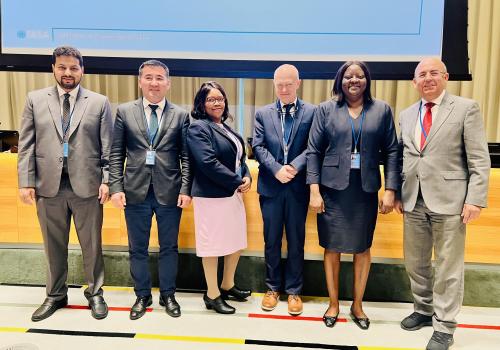The Secretariat and Member States of the Southern African Development Community (SADC) took part in the Twentieth Session of the United Nations Forum on Forests (UNFF20) which was held from 5-9 May 2025 at the United Nations Headquarters in New York, United States of America.
The SADC Member States that participated include Angola, Botswana, Democratic Republic of Congo (DRC), Madagascar, Namibia, South Africa and Zimbabwe. They joined calls from the international community for accelerated implementation of the United Nations Strategic Plan for Forests 2030 (UNSPF), a reference framework document for the forest related work of the United Nations bodies and partners with programmes on forests; enhanced international cooperation and financing for forestry management programmes; increased visibility and support for dryland forests; strengthened national commitments and innovative funding mechanisms; and greater engagement of local communities including women and youth.
During the plenary sessions and side events during the UNFF 20, SADC delegates showcased initiatives aimed at restoring degraded forests, promoting community-based forest management, and enhancing biodiversity conservation, emphasising the important role that forests play in combating climate change and achieving Sustainable Development Goals (SDGs).
SADC Member States highlighted activities aimed at raising awareness of the significance of forests at national level, including the commemoration of the International Day of Forests which falls on 21 March every year and provides an opportunity for engagement among traditional leaders, the public and other relevant stakeholders to promote the role of forests.
Ms. Ndapanda Kanime, Senior Programme Officer for Natural Resources and Wildlife at the SADC Secretariat who led the SADC Secretariat delegation to the 20th Session of the UNFF addressed the delegates on the contribution of SADC towards achieving priority themes of the United Nations Strategic Plan for Forests 2030. She highlighted that SADC Member States continue to contribute to the implementation of the UNSPF through their national forestry programmes that are aligned with the targets and goals of the UN Strategic Plan for Forests.
Ms. Ndapanda called for continued collaboration in the implementation of the SADC Forestry Strategy, which seeks to ensure that SADC Member States have the capacity to sustainably manage and use both national and transboundary forest resources through unilateral, bilateral, regional and international frameworks to provide for the economic development and ecosystem services to the people of the SADC region
She welcomed the establishment of the Global Forest Financing Facilitation Network as a clearing house aimed at enhancing countries’ access to data on forest financing and acknowledged the efforts by the UNFF Secretariat in implementing communication and outreach strategy of the United Nations Strategic Plan for forests 2017-2030.
On 7th May, SADC Member States took part in a Panel Discussion on the “Call for Action on Dryland Forests” where delegates stressed the need for building on the existing partnerships and use the tools, knowledge and momentum for forest management as a vital tool for global resilience, supporting biodiversity and climate resilience. They also called for South-South Cooperation and investment in capacity building on dryland forest conservation and management.
During the panel discussion, SADC called for urgent action among partners and stakeholders to address the threat posed by land degradation, agriculture expansion, infrastructure development and impact of climate change which are exerting pressure on forest, water resources and soils. The SADC Member States highlighted that SADC has placed sustainable natural resource management at the heart of its regional integration and development agenda through the SADC Regional Indicative Strategic Development Plan (RISDP) 2020-2030, implemented through the SADC Forestry Strategy, SADC Regional Biodiversity Strategy and the SADC Climate Change Strategy and Action Plan which provide a framework for integrated policy making and programme implementation.
The discussion during the Session revolved around key priorities of the UNFF which include;
Reversing the loss of forest cover worldwide through sustainable forest management, including protection, restoration, afforestation and reforestation, and increase efforts to prevent forest degradation and contribute to the global effort of addressing climate change.
Increasing significantly the area of protected forests worldwide and other areas of sustainably managed forests, as well as the proportion of forest products from sustainably managed forests.
Promoting governance frameworks to implement sustainable forest management, including through the United Nations Forest instrument, and enhance the contribution of forests to the 2030 Agenda for Sustainable Development.
At the end of the Meeting, delegates reaffirmed commitment to sustainable forest management as a cornerstone of sustainable development, ensuring that forests remain central to supporting climate resilience, conservation of biodiversity, and the securing the well-being of future generations across the world.

